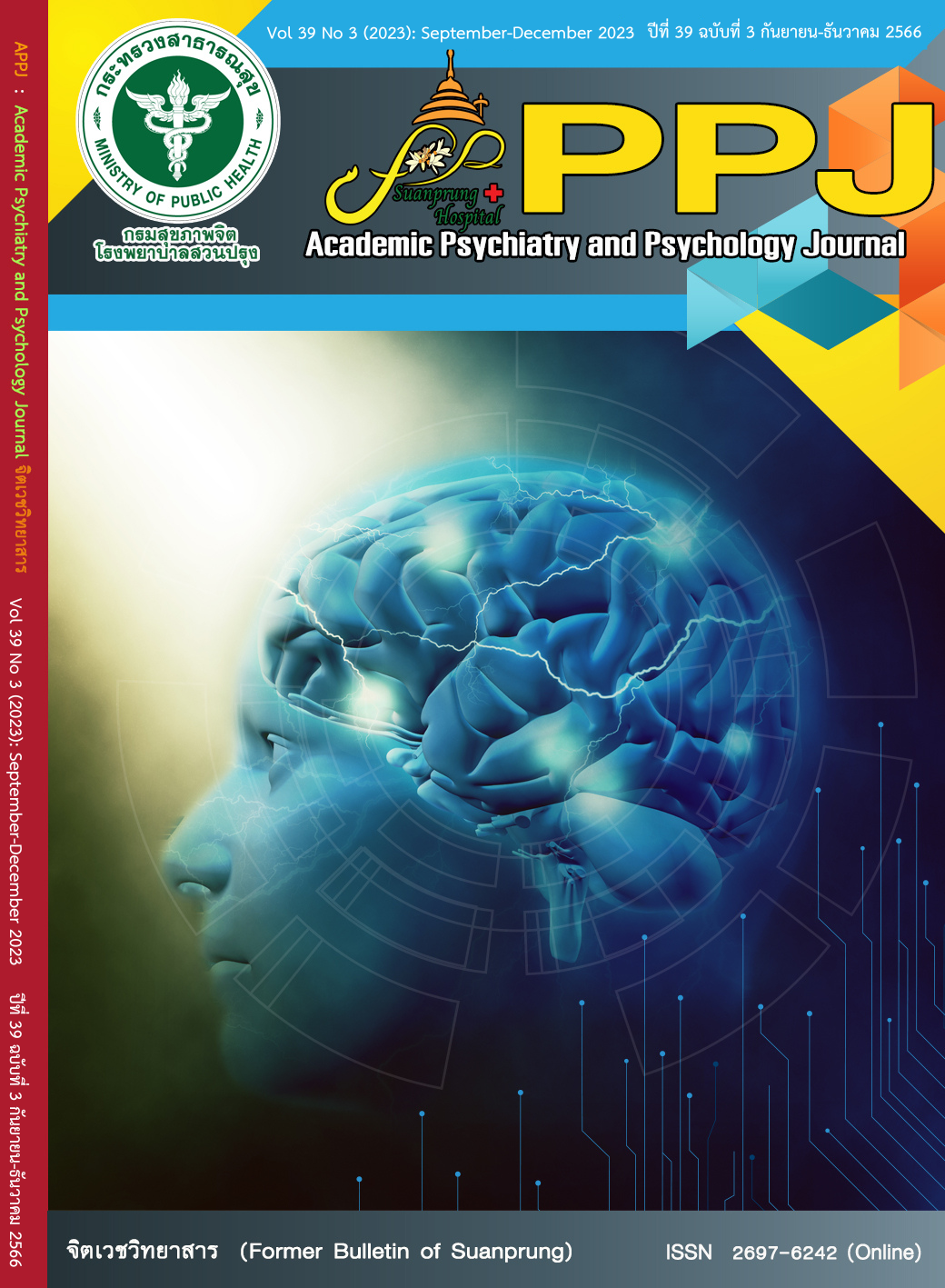Original article Effects of the Self-Control Program on Game Addiction Behavior of Early Adolescents
Main Article Content
Abstract
Abstract
Objectives: To study the effects of a self-control program on game addiction behavior of early adolescents.
Materials and methods: A quasi-experimental research model was used. Pre- and post-trial measurements were compared. The subjects in this study were second-year secondary school students aged 10-14 years, divided into experimental and control groups with 13 participants each. The control group had normal classes, while the experimental group practiced a self-control program on game addiction in early adolescence. Research instruments included: personal data records, game addiction tests and self-control programs on gaming addiction developed by the researcher based on Rosenbaum’s self-control concept. Data were analyzed using descriptive statistics, independent 2-group T-test statistics, and 2-group independent T-test statistics.
Result: One month after receiving the self-control program, the experimental group's average score for game-addicted behavior of early adolescents was statistically significantly lower than before receiving the program (p < .01). And one month after receiving the self-control program, the average score for game-addicted behavior of early adolescents in the experimental group was statistically significantly lower than that of the control group (p < .01).
Conclusion: A self-control program against game addiction behavior in early adolescents may increase their self-efficacy skills, problem solving skills, and self-control skills, reducing game addiction in early adolescence.
Article Details

This work is licensed under a Creative Commons Attribution-NonCommercial-NoDerivatives 4.0 International License.
บทความหลังผ่านการปรับแก้จากกองบรรณาธิการแล้ว เป็นลิขสิทธ์ของวารสารจิตเวชวิทยาสาร โรงพยาบาลสวนปรุง กรมสุขภาพจิต กระทรวงสาธารณสุข ห้ามเผยแพร่เพื่อประโยชน์ทางการค้าโดยไม่ได้รับอนุญาต แต่อนุญาตให้เผยแพร่บทความดังกล่าวเพื่อประโยชน์ทางการศึกษาแก่ประชาชนทั่วไป ทั้งนี้กองบรรณาธิการไม่จำเป็นต้องเห็นด้วยกับบทความหรือข้อคิดเห็นใดๆ ที่ปรากฏในวารสารสวนปรุง
References
Social WA. Digital 2021 Global Overview Report. [online]. Available from: https://techsauce.co/tech-and-biz/digital-2021-overview-report [2021 Aug 18]. (in Thai).
Stevens MW, Dorstyn D, Delfabbro PH, King DL. Global prevalence of gaming disorder: A systematic review and meta-analysis. SAGE journals 2020;55:553–68.
Chuaykum L. Criminal measures for rehabilitation and prevention of game addiction in children [LL.M. thesis]. Bangkok: Chulalongkorn University; 2018. (in Thai)
Pongthanawisuth S. Brain development, development for cognitive thinking and psychosocial aspects in adolescents. [online]. Available from: https://meded.psu.ac.th/binla/class05/388_551/Neurological_cognitive_and_psychosocial_development_in_adolescence/index.html [2021 Oct 25]. (in Thai)
Charoenwanit S. Game Addiction Behaviors: Impacts And Preventions. Thai Science and Technology Journal 2014;22:871-97. [online]. Available from: https://li01.tci-thaijo.org/index.php/tstj/article/view/22437 [2021 Oct 25]. (in Thai)
Department of Mental Health. Report of service recipients for the whole country 2020. [online]. Available from: https://www.dmh.go.th/report/datacenter/hdc/reds.asp [2021 Aug 20]. (in Thai)
Muangchuen P. Effects of physical activity program based on self-regularion theory to decrease game addiction behaviors of lower secondary school students [B.Ed. thesis]. Bangkok: Chulalongkorn University; 2016. (in Thai)
Korthamnivet S. Ask, answer, pay attention to your mental health 1. Bangkok: Chulalongkorn University; 2015. (in Thai)
Indah Andriani A, Fatmawati, & Haerati. The effect of cognitive behavior theraphy on online gaming addiction in adolescents. Comprehensive Health Care 2021;5:16-25.
Octavian V, Vasile D. Cognitive-behavioral therapy for internet gaming disorder and alcohol use disorder - A case report. International Journal of Psychiatry and Psychotherapy 2017;2:34-8.
Mayang A, Mulawarman M. The effectiveness of motivational interviewing counseling to improve psychological well-being on students with online game addiction tendency. Islamic Guidance and Counseling Journal 2021;4:106-15. (in Thai)
Thaithani P, Promoting Intrinsic motivation among learners. Ratchaphruek Journal 2020;18:9-19. (in Thai)
Apisitwasana N, Perngparn U, & Cottler L. Effectiveness of school- and family-based interventions to prevent gaming addiction among grades 4–5 students in Bangkok,Thailand. Psychology Research and Behavior Management 2018;11:103-15. (in Thai)
Lianyang T, Intaprot P. Effect of the self-control program on online game addiction behavior of upper secondary school students. Panyapiwat Journal 2558;7:185-93. (in Thai)
Rajan Kulu Institute. Handbook of organizing activities to build capacity for school-aged children, editor. Bangkok: The agricultural cooperative assembly of Thailand limited printing house; 2016. (in Thai)
Naiyapatana O. Statistical Power of Testing: Considerations for Determining Sample Size for Research. Journal of Behavioral Science 2001;7:1-19. [online]. Available from: http://bsris.swu.ac.th/journal/70544/file/71.pdf [2021 Aug 20]. (in Thai)
Polit F Denise BCT. Nursing research: Principles and methods 7, editor. Philadelphia: Lippincott Williams & Wilkins; 2004.
Pornnoppado C, Sornpaisarn B, Khamklieng K, Pattana-amorn S. The development of game addiction screening test (GAST). J Psychiatr Assoc Thailand 2557;59:3-14. (in Thai)
Rosenbaum M. Learned Resourcefulness: on coping skill, self-control, and adaptive behavior. New York: Springer Publishing Company; 1980.
Department of Mental Health, Ministry of Public Health. A guide to promoting mental health in secondary school students for teachers. 8ed. Bangkok: WVO officer of printing mill; 2003. (in Thai)
Department of Mental Health, Ministry of Public Health. A set of handbooks for organizing youth skill-building activities like games for adolescent mental health practitioners in the community (Smart Gamer Package). Bnagkok: Institute of Child and Adolescent Mental Health.; 2013. (in Thai)
Department of Mental Health, Ministry of Public Health. Event guide “practice thinking, solving problems, developing EQ” for volunteers / leaders of peean jai center TO BE NUMBER ONE. Nonthaburi: Kaew Chao Chom Media and Publications Center Suan Sunandha Rajabhat University; 2015. (in Thai)
Lifestyle Issue. 5 techniques for dividing game time not losing work and studying away from gaming addiction [Internet]. 2019 [2021 Aug 22]. Available from: https://www.lifestyleissue.com/health/manage-game-playing-time/. (in Thai)
Changngern K, Srisawat P, Saenubol K. Integrative group counseling for reducing game addiction among junior high school students [M.Ed thesis]. Bangkok: Srinakharinwirot University; 2021. (in Thai)
Phumhiran Y. The effects of guidance activities for self-control in behaviors addicted to computer games of students in Mattayomsuksa 1, Rattanakosinsomphot Bangkhuntien School Bangkok [M.Ed thesis]. Nonthaburi: Sukhothai Thammathirat University; 2007. (in Thai)
Khrobsorn C, Chaimongkol N. Stress and coping behaviors among adolescent in the observation and protection center. The Journal of Faculty of Nursing Burapha University 2556;21:1-12.[online]. Available from https://he02.tci-thaijo.org/index.php/Nubuu/article/view/51471/42630 [2021 Aug 22]. (in Thai)

